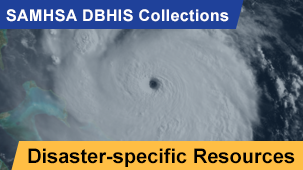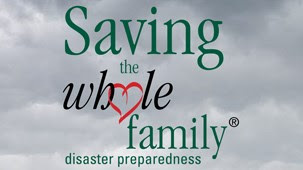
Hurricanes: Preparedness for a Safer Season |
Being prepared and knowledgeable before a hurricane strikes is vital for making good decisions during a disaster. But most Americans are not fully prepared—for hurricanes or other disasters. A survey from the Federal Emergency Management Agency (FEMA) found that only 39 percent of American adults have developed an emergency plan and discussed it with the other members of their household, even though 80 percent of Americans live in counties that have been hit by a natural disaster since 2007 (FEMA, 2015)1.
The following resources can help individuals and families in planning for a hurricane. |
Disaster-specific Resources: Hurricane This SAMHSA Disaster Behavioral Health Information Series (DBHIS) installment features resources involving hurricane preparedness, related disasters such as floods, and general disaster preparedness and response. The DBHIS installment has resources from the American Red Cross, FEMA, the National Child Traumatic Stress Network, and more. This SAMHSA Disaster Behavioral Health Information Series (DBHIS) installment features resources involving hurricane preparedness, related disasters such as floods, and general disaster preparedness and response. The DBHIS installment has resources from the American Red Cross, FEMA, the National Child Traumatic Stress Network, and more. |
Saving the Whole Family: Disaster Preparedness This resource from the American Veterinary Medical Association was developed for families with animals, including pets and livestock. This guide has tips and checklists to support families in evacuating and putting together first aid kits for an array of animals, including small animals, horses, cattle and other livestock, and backyard poultry. The guide can also be found in Spanish here. This resource from the American Veterinary Medical Association was developed for families with animals, including pets and livestock. This guide has tips and checklists to support families in evacuating and putting together first aid kits for an array of animals, including small animals, horses, cattle and other livestock, and backyard poultry. The guide can also be found in Spanish here. |
Mississippi Hurricane Preparedness Guide Developed by the Mississippi Emergency Management Agency for the hurricane season, this guide outlines how to make a plan so that during a hurricane individuals and families can better make quick, smart decisions. The guide features tips on what to do during a hurricane watch versus a warning, if winds become strong, and when to stay home and when to plan to evacuate. The resource has a section on special needs preparedness, as well as activities to help involve children in the learning process. Developed by the Mississippi Emergency Management Agency for the hurricane season, this guide outlines how to make a plan so that during a hurricane individuals and families can better make quick, smart decisions. The guide features tips on what to do during a hurricane watch versus a warning, if winds become strong, and when to stay home and when to plan to evacuate. The resource has a section on special needs preparedness, as well as activities to help involve children in the learning process. |
Tips for Keeping Children Safe in a Hurricane At this web page, Save the Children offers parents and caregivers information about keeping their children safe during and after a hurricane. It walks readers through preparing a go-bag for a child and helping children feel confident by including them in the preparedness process. After a hurricane, it covers the importance of limiting media and watching children for possible changes in behavior. At this web page, Save the Children offers parents and caregivers information about keeping their children safe during and after a hurricane. It walks readers through preparing a go-bag for a child and helping children feel confident by including them in the preparedness process. After a hurricane, it covers the importance of limiting media and watching children for possible changes in behavior. |
Help Improve SAMHSA’s Disaster Services and Products As a subscriber to this newsletter, you are invited to participate in a short, web-based survey to provide the SAMHSA Disaster Technical Assistance Center (DTAC) with feedback about your experiences with our products and services. The survey should take no more than 15 minutes. Complete the survey by clicking on this link, or copy and paste the URL https://iqsolutions.qualtrics. As a subscriber to this newsletter, you are invited to participate in a short, web-based survey to provide the SAMHSA Disaster Technical Assistance Center (DTAC) with feedback about your experiences with our products and services. The survey should take no more than 15 minutes. Complete the survey by clicking on this link, or copy and paste the URL https://iqsolutions.qualtrics. |
Subscribe to The Dialogue
The Dialogue is a quarterly e-newsletter that provides practical and down-to-earth information for disaster behavioral health coordinators, local service providers, federal agencies, and nongovernmental organizations. You can subscribe to the newsletter or contact the SAMHSA Disaster Technical Assistance Center (DTAC) by email at dtac@samhsa.hhs.gov to contribute an article to an upcoming issue.
|
Questions About the SAMHSA DTAC Bulletin?
The SAMHSA DTAC Bulletin is a monthly newsletter used to share updates in the field, post upcoming activities, and highlight new resources. For more information, please contact:
The views, opinions, and content expressed in this publication do not necessarily reflect the views, opinions, or policies of the Center for Mental Health Services (CMHS), the Substance Abuse and Mental Health Services Administration (SAMHSA), or the U.S. Department of Health and Human Services (HHS).
1 FEMA. (2015, April 28). Sixty percent of Americans not practicing for disaster: FEMA urges everyone to prepare by participating in National PrepareAthon! Day on April 30 [release number HQ-15-019]. Retrieved from https://www.fema.gov/news-
|































No hay comentarios:
Publicar un comentario